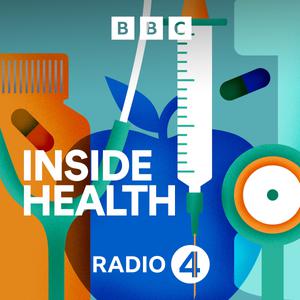
The BMJ Podcast
The BMJ
Leading the debate on health to engage, inform, and stimulate doctors, researchers, and other health professionals.
- 41 minutes 6 secondsConviviality and TV doctors, polar bear tales, and Christmas research
In the last podcast of 2024, Richard Smith, former editor of The BMJ and head of UKHACC will be making the case for being more convivial. Tina Korownyk, professor of family medicine at the University of Alberta is the ghost of Christmas past for TV doctors.
Tim Feeny and Navjoyt Ladher take us through this year's Christmas research papers.
And finally, Mari Martensen, a paramedic, explains what makes being a medic in Svalbard bear-able.
Reading list.
- The dangers of industrialisation—why we need to rebuild a convivial society
- Televised medical talk shows—what they recommend and the evidence to support their recommendations
- Christmas 2024: How to transport a polar bear, and other idiosyncrasies for Arctic emergency medical services
- The full Christmas archive
30 December 2024, 5:00 am - 32 minutes 56 secondsBig food infiltration of UK Schools, and chocolate consumption and diabetes
Conflicts of interest harm health, and a new investigation uncovers the infiltration of big food manufacturers into UK schools. Emma Wilkinson reports on that investigation. Kamran and Rebecca Coombes, head of journalism, discuss moves to reduce industry's impact on food policy in the UK.
A new research paper has identified a link between eating chocolate and lower rates of diabetes. Binkai Liu, doctoral student and Qi Sun, associate professor, at the Harvard T.H. Chan School of Public Health explain what they found.
Finally, Sam Hutt is a doctor in the NHS, but is better known by his stage persona “Hank Wangford”. Hank performed a celebration of the NHS at Glastonbury this year, and has now released that song. He joins us to talk about what inspired him.
Reading list
Food industry has infiltrated UK children’s education: stealth marketing exposed Chocolate intake and risk of type 2 diabetes17 December 2024, 1:58 pm - 33 minutes 19 seconds"Incredibly distressing and incredibly dangerous"- David Miliband on healthcare attacks, and staff turnover effect on patient outcomes
In today’s episode, new research, which has looked at the impact staff turnover is having on patient outcomes. Giuseppe Moscelli, associate professor at the University of Surrey joins Navjoyt Ladher to explain more.
Also, every year the BMJ has a Christmas appeal - and this year we have chosen the International Rescue Committee as our partner. To talk more about what they do, and to give us some insight into how geopolitics are affecting health we're joined David Milliband, president and chief executive officer of the International Rescue Committee, and former UK foreign secretary.
Reading list;
Nurse and doctor turnover and patient outcomes in NHS acute trusts in England
4 December 2024, 11:11 am - 32 minutes 14 secondsHow MSF maintains neutrality in conflict zones
This week we’re at the World Innovation Summit for Health, where we’re a media partner - the meeting is focussing on conflict, equity and resilience.In that vein, we’re joined by Christos Christou, international president of Médecins Sans Frontières (MSF) to talk about attacks on healthcare staff, and the difficulty and importance of maintaining neutrality in conflict zones.
Ara Darzi, surgeon, executive chair of the conference, and author of the recent NHS review, joins us to talk about antimicrobial resistance, and how diagnostics and a small funding commitment could head off the problem.
And finally, we change our focus to the US, and hear about new research into adverse events during surgery with authors Antoine Duclos and David Bates from Harvard Medical School.
Reading list.
We need to do more to keep antibiotics working
WISH report - Tackling Antimicrobial Resistance: How to Keep Antibiotics Working for the Next Century
20 November 2024, 5:00 am - 37 minutes 41 secondsConflict zones, women’s health research, and reimagining palliative care
In this episode, we speak to the doctor overseeing the WHO’s emergency response for the eastern mediterranean region - including Gaza, Lebanon, Sudan and Yemen. Richard Brennan joins us to talk about protecting health services, and workers, in the escalating armed conflicts that are affecting the region.
Menaka Paranathala and Emma Rourke, from The BMJ, are on to talk about improving research into women’s health. A new UK project, MESSAGE, aims to give consideration to sex and gender in life science research.
Palliative care is not just for end-of-life, and rethinking how it’s integrated into every speciality is the key to improving care for patients, argue Richard Harding, Anna Peeler, and Oladayo Afolabi from the Cicely Saunders Institute.
Links
2 November 2024, 6:00 am - 41 minutes 8 secondsClimate leadership - knowledge is power
It’s an often cited statistic that if healthcare was a country, it would be the fifth largest carbon emitter. At The BMJ we want to change that, and move healthcare towards a more sustainable future.
In this week’s episode, we’ll hear about our annual climate edition from two of The BMJ’s editors, Sophie Cook and Juliet Dobson.
We’ll be diving into Cli-Fi and asking how climate fiction can galvanise our collective response to climate change. Our panel includes Howard Frumkin, professor emeritus at University of Washington. Lakshmi Krishnan, internist and Director of Medical Humanities at Georgetown university, and Sarah Grossman, journalist and author of Fire So Wild.
And Finally, Tereza Kasaeva, director of the WHO’s Global Tuberculosis Programme, explains how migration and food insecurity, exacerbated by climate change, are affecting TB - and why, despite effective treatment, there are still over a million deaths from the disease annually.
Our panel's cli-fi book recommendations
- A Fire So Wild - Sarah Grossman
- The Last Man - Mary W. Shelly
- The Broken Earth - NK Jemisin
- Oryx and Crake - Margaret Attwood
- The Ministry for the Future - Kim Stanley Robinson
- Olga Dies Dreaming - Xóchitl González
- Land of Milk and Honey - C Pam Zhang
- Day of the Triffids - John Wyndham
Links
- The BMJ’s annual climate issue
- Cli-Fi—helping us manage a crisis
- Writing towards a healthier future amid climate disaster
- WISH report - Tuberculosis
Lakshmi’s references
- Fundamental Role of Arts and Humanities in Medical Education
- Capable of being in uncertainties’: applied medical humanities in undergraduate medical education
- The introduction of medical humanities in the undergraduate curriculum of Greek medical schools: challenge and necessity
- The medical humanities at United States medical schools
19 October 2024, 8:00 am - 21 minutes 34 secondsGetting science into policy for gun control and NHS reform
How science can be transformed into policy?
One of the seemingly intractable issues when it comes to legislative change in the US is gun control. One reason policy change is so difficult, is the US specific evidence vacuum, but that’s beginning to change.
We're joined by Louis Klarevas, an academic at the University of Colombia and author of the book “Rampage Nation, securing america from gun violence" and Shannon Watts, from Moms Demand Action which is a grassroots movement of Americans fighting for public safety measures that can protect people from gun violence.
Even when there is evidence, the trade-offs needed for legislative change can still paralyse policy makers. Citizen assemblies, a form of democratic participation that asks the public for their views, has helped clarify some key healthcare issues, from assisted dying in Jersey, to abortion access in Ireland.
Rebecca McKee from the Institute of Government argues they could be used to fix the NHS, and joins us to explain how.
Reading list
More gun regulation, less firearm harm
Citizens’ assemblies, health, and health policy
12 October 2024, 4:00 pm - 21 minutes 49 secondsNutrition for health and conflicts of interests
Under-nutrition harms health, but so does over-nutrition.
The Bill and Melinda Gate’s foundation has just released their Goalkeepers' report - highlighting the detrimental impact that poor nutrition is having on children’s health. Rasa Izadnegahdar, director of Maternal, Newborn, Child Nutrition & Health at the foundation joins us to explain how they are targeting nutritional interventions.
Also this week, a new investigation in The BMJ has found that the UK government’s Scientific Advisory Committee on Nutrition - the people who help guide the UK’s nutrition policy - have competing interests with the food industry. We hear from Chris van Tulleken, University College London; Rob Percival, the Soil Association; and Alison Tedstone, chair of the Association for Nutrition.
Reading list:
UK government’s nutrition advisers are paid by world’s largest food companies, BMJ analysis reveals
27 September 2024, 5:46 pm - 22 minutes 58 secondsImproving data for quality care when resources are stretchedThere's a real drive to strengthen quality of care in facilities around the world. However, no matter where you are, improving healthcare depends on quality data—and collecting and using that data can be challenging without the time and expertise. In this podcast, we explore how different healthcare systems, especially those with limited resources, are tackling the challenge of data collection and use head-on. The BMJ has partnered with the World Health Organization and the World Bank on a Collection on Quality of Care. This podcast, the second in a series exploring themes from the Collection, features researchers and implementers from Ghana, Qatar, and the US. They share insights on improving and using data in resource-constrained environments, offering valuable perspectives relevant to healthcare systems worldwide facing similar challenges. Provenance statement: This podcast is part of a Collection on Quality of Care proposed and funded by the World Health Organization and the World Bank. The BMJ commissioned, edited, and published the podcast. Emma Veitch, Rachael Hinton and Duncan Jarvis were the lead editors for The BMJ.17 September 2024, 12:01 am
- 28 minutes 47 secondsGPs' industrial action, and the olympians after the games
The news that GPs in England have voted for industrial action has spooked the healthcare system - Katie Bramall-Stainer, the chair of the BMA's General Practice Committee explains what's lead to this, and why trust in the government has gone.
After the games, olympians and paralympians return to their normal lives - but what does that mean for their healthcare, especially in the US where insurance is expensive? Jonathan Finnoff, chief medical officer for the US Olympic and Paralympic committee joins us to explain how athletes are supported outside the games.
Reading list;
GP leader: “If general practice is the bedrock of the NHS, then the NHS is collapsing”
9 September 2024, 3:09 pm - 25 minutes 43 secondsMulti-cancer detection and NHS HIT Lists
This week we're questioning the effectiveness of the Galleri Test for early cancer detection with investigation authors Margaret McCartney and Deborah Cohen. They delve into the decision-making and politics behind this test's introduction in the UK.
The episode also covers the growing NHS waiting list crisis and how Imran Ahmed and his team at Guy's and St. Thomas' NHS Trust are using high intensity theatre (HIT) lists to increase surgical throughput - and what other teams need to know, if a national rollout of this model is to happen.
Reading list
Are surgical HIT lists the answer to bringing down NHS waiting times?
14 August 2024, 5:23 pm - More Episodes? Get the App
Your feedback is valuable to us. Should you encounter any bugs, glitches, lack of functionality or other problems, please email us on [email protected] or join Moon.FM Telegram Group where you can talk directly to the dev team who are happy to answer any queries.
 BMJ Best Practice Podcast
BMJ Best Practice Podcast
 Primary Care Knowledge Boost
Primary Care Knowledge Boost
 You Are Not A Frog
You Are Not A Frog
 GPnotebook Podcast
GPnotebook Podcast
 NB Hot Topics Podcast
NB Hot Topics Podcast
 Inside Health
Inside Health